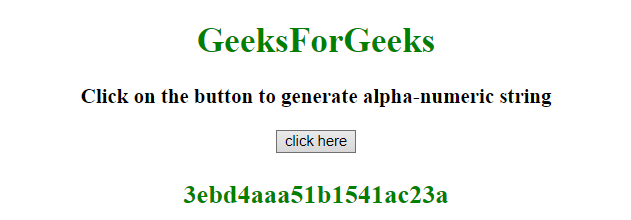Bash Script Generate Random Key
How do I create or generate random numbers (sequence of numbers that lack any pattern), under Bash shell?
The bash shell offers $RANDOM variable (it also works with ksh). From the bash man page:
Terraform allows you to define and create complete infrastructure deployments in Azure. You build Terraform templates in a human-readable format that create and configure Azure resources in a consistent, reproducible manner. This article shows you how to create a complete Linux environment and supporting resources with Terraform.
- Oct 27, 2015 To generate a random number in a UNIX or Linux shell, the shell maintains a shell variable named RANDOM. Each time this variable is read, a random number between 0 and 32767 is generated. To enhance the randomization process, the RANDOM variable should be initialized (seeded) to an initial value (like the process ID of the current shell, which.
- $RANDOM is an internal Bash function (not a constant) that returns a pseudorandom integer in the range 0 - 32767. It should not be used to generate an encryption key. Example 9-11.
Each time this is referenced, a random integer between 0 and 32767 is generated. The sequence of random numbers may be initialized by assigning a value to RANDOM. If RANDOM is unset, it loses its special properties, even if it is subsequently reset.
To view $RANDOM, enter:$ echo $RANDOM
Sample outputs:
You can use the bash loop as follows to test random numbers:
Sample outputs:

You can store it to a variable as follows:
Adobe acrobat pro x trial download. Jun 09, 2011 Anonymous said. I need permanent activation keys please guys, I am using this almost everyday 'Acrobat pro' November 10, 2017 at 5:57 PM. Adobe Acrobat X Pro 10.1.16 serial number keygen can be taken here. Use it for free, no registration, no annoying ads You can find almost any keygen for any existing software.Lots of other keygens are presented in our resource.
You can have a random integer number within a certain range as follows:
Here is a sample shell script to find out random TCP port:
Linux Generate Random Number
Another shell script to setup a random wallpaper. You can call this one from your crontab:
Using /dev/urandom or /dev/random
The character special files /dev/random and /dev/urandom provide an interface to the kernel’s random number generator. You can use /dev/urandom as follows:$ od -vAn -N4 -tu4 < /dev/urandom
Sample outputs:
You can use /dev/random as follows:$ od -An -N2 -i /dev/random
Sample outputs:
Recommended readings:
See the following man pages:man 4 random
man bash
man od
ADVERTISEMENTS
Sometimes you need to create a temporary file in your shell script. There are various methods exist to create a random temporary file name. It is quite useful if your application/shell scripting needs temporary unique file names.
This is a method I've created to generate a URL safe unique key: import random; def generateuniquekey: array = for lett. Stack Exchange Network Stack Exchange network consists of 175 Q&A communities including Stack Overflow, the largest, most trusted online community for developers to learn, share their knowledge, and build their careers. Hello, I need to generate random numbers (integers or double) and use binomial distribution within an enclave. The user guide mentions that is not included for SGX, while a random number can be generated using sgxreadrand function in. First, how do I use sgxreadrand to generate random integers? It seems only unsigned char is added to the input buffer. There are multiple ways of generating an encryption key. Most implementations rely on a random object. All examples mentioned here use a secure cryptographic randomizer. '.join(random.choice(string.asciiuppercase + string.digits) for in range(N)) This is an excellent method, but the PRNG in random is not cryptographically secure. I assume many people researching this question will want to generate random strings for encryption or passwords. You can do this securely by making a small change in the above code. Custom alphabet Generate random ASCII using these characters. (Select custom charset option to enable it.) Pro tips Master online ascii tools. You can pass options to this tool using their codes as query arguments and it will automatically compute output. To get the code of an option, just hover over its icon. Sgx generate ascii random key.
Method # 1 Use of mktemp or tempfile utility
As the name suggest, both of the following commands create a unique temporary file or directory. Just type the mktemp at the shell prompt to create it a temp file or dir:$ mktemp
Sample outputs
OR$ tempfile
Sample outputs:
Please note that the tempfile command is deprecated; you should use always use mktemp command instead. So to create a temp file:
To create a temp dir:
How to make a directory
Make a unique temporary directory instead of a file using -d option. The syntax is:$ mktemp -d
A shell script example
Rest of the following methods are insecure and do not use them in production. They are here for historical reasons only.
Method #2: Use $RANDOM bash shell variable
At shell prompt type the command:$ echo $RANDOM
Sample outputs:

You can use it as follows:
Method # 3 Use of $$ variable
This is old and classic method. $$ shell variable returns the current running process this can be use to create unique temporary file as demonstrated in following script:vi random2.bash
Generate Ssh Key Bash
Save the script and execute as follows:$ chmod +x random2.bash
$ ./ random2.bash
Use this method if your script needs only ONE temporary file.
ADVERTISEMENTS